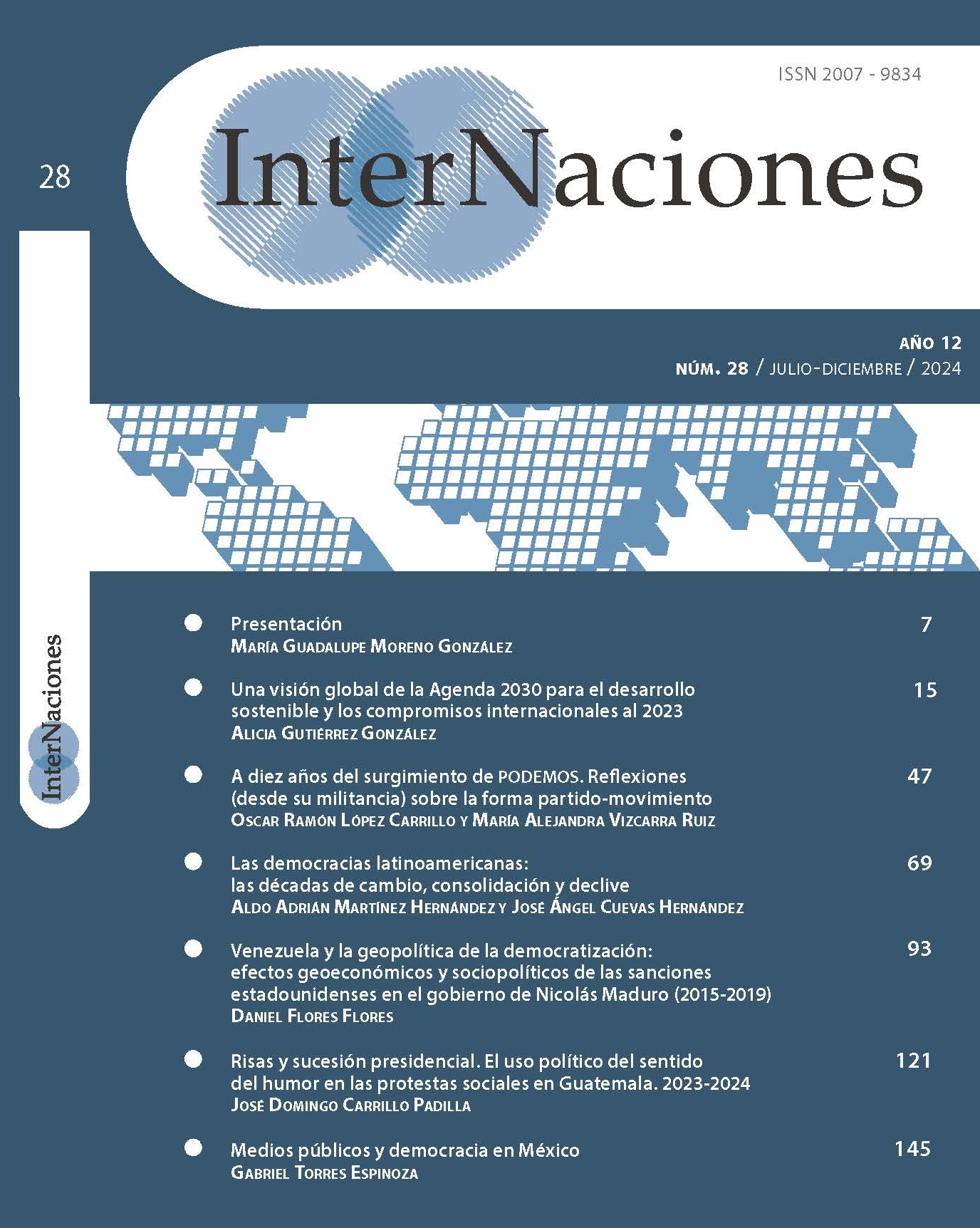Latin American democracies: decades of change, consolidation and decline
DOI:
https://doi.org/10.32870/in.vi28.7299Keywords:
democracy, Latin America, democratization, Interamerican Democratic Charter, consolidationAbstract
Latin America has maintained relative stability in its democratic institutional processes, and the region has established various international commitments focused on strengthening democracy. One of them was the adoption of the Interamerican Democratic Charter (IDC), which a little more than two decades after its signing, the question remains: what has happened in Latin American democracies? To provide an answer, the research aims to evaluate the development of democracy in Latin America in relation to the principles enunciated by the IDC. To this end, the descriptive research presents a quantitative and multidimensional methodological design with which it is possible to identify the evolution and current state of Latin American democracies. With this, a vision of democracy at the regional level is obtained, which allows a classification of the types of Latin American democracies and identifies the challenges still to be faced.Downloads
References
Alcántara Sáez, M. (1994; 2004). Gobernabilidad, crisis y cambio. México. Fondo de Cultura Económica. México.
Alcántara Sáez, M. (2008). La democracia en América Latina: calidad y rendimiento. Revista Sistema.
Alcántara Sáez, M. y Martínez-Hernández, A.A. (2016). Acerca de la Democratización y sus Métodos de Investigación en la obra de Michael Coppedge. En Ayala Sánchez, A. (Coord) Visiones Críticas de la Democracia Electoral. México. Códice/ Taller Editorial. Editora Periodística y Análisis de Contenidos S.A. de C.V. Universidad Veracruzana. Instituto de Investigaciones Jurídica, Veracruz.
Almond, G. (1963). Political Systems and Political Change. American Behavioral Scientist. (6): 3-10.
__________. (1965). Developmental Approach to Political Systems. World Politics. 17 (2):183-214.
Alvarez, M.; Cheibub, J.A.; Limongi, F. y Przeworski, A. (1996). Classifying political regimes. Studies in Comparative International Development, Summer. Vol. 31, No. 2, 3-36.
Anderson, C.J. (2007). The End of Economic Voting? Contingency, Dilemmas and the Limits of Democratic Accountability. Annuals. (10): 272-296.
Barragán, M. y Martínez-Hernández, A.A. (2023) “Elections et Systemes Electoraux en Amerique Latine”. En Kevin Parthenay y Frédéric Louault (ed) Politique de l'Amérique latine. Traités de Science Politique. París, Francia. Editorial Larcier. (Cap. X: pp. 545-586).
Bohigues García, A. (2021). Elites, radicalismo y democracia: un estudio comparado sobre América Latina. Madrid. Centro de Investigaciones Sociológicas.
Boix, C. (2006). The Roots of Democracy. Policy Review. (135).
Coppedge, M.; Gerring, J. y Lindberg, S. I. (2012). Variedades de democracia (V-Dem): un enfoque histórico, multidimensional y desagregado. Revista Española de Ciencia Política. (30): 97-109.
Coppedge, M. (2012). Democratization and Research Methods. Cambridge University Press.
Coppedge, M., J. Gerring, C. H. Knutsen, S. Lindberg, J. Teorell, N. Alizada, D. Altman, M. Bernhard, A. Cornell, M. S. Fish, L. Gastaldi, H. Gjerløw, A. Glynn, A. Hicken, G. Hindle, N. Ilchenko, J. Krusell, A. Luhrmann, S. F. Maerz, K. L. Marquardt, K. McMann, V. Mechkova, J. Medzihorsky, P. Paxton, D. Pemstein, J. Pernes, J. von Römer, B. Seim, R. Sigman, S. E. Skaaning, J. Staton, A. Sundström, E. Tzelgov, Y. Wang, T. Wig, S. Wilson y D. Ziblatt. (2024) V-Dem [Country–Year/Country–Date] Dataset v11.1” Varieties of Democracy Project. https://doi.org/10.23696/vdemds21
Dahl, R. (1989). La poliarquía. Madrid. Tecnos.
Downs, A. (1973) Teoría económica de la democracia. Madrid. Aguilar.
__________. (1987). The Evolution of Democracy: How Its Axioms and Institutional Forms Have Been Adapted to Changing Social Forces. Daedalus, 116 (3): 119-148.
Easton, D. (1966). Categorías para el análisis sistémico de la política. En Battle, Albert. Diez textos básicos de ciencia política. México. Ariel.
__________. (1992). Enfoques sobre teoría política. Barcelona. Amorrortu Editores.
Escobar, M. (2011). La calidad democrática. Una propuesta para su medición por expertos. Revista española de investigaciones sociológicas. (133): 59-80.
Fisichella, D. (2009). Robert Dahl: The Democratic Poliarchy. En D. Campus y G. Pasquino (eds.) Master of Political Science. Wivenhoe Park. ECPR Press, (pp. 11-36).
Fuchs, D. y Klingemann, H.D. (2009). David Easton: The Theory of the Political System. En D. Campus y G. Pasquino (eds.) Master of Political Science. Wivenhoe Park. ECPR Press, (pp. 63-84).
Hellwig, T. (2008). Explaining the salience of left-right ideology in post-industrial democracies: The role of structural economic change. European Journal of Political Research. ECPR. 47 (6):687-709.
Kapstein, E.B. y Converse, N. (2008). Why Democracies Fail. Journal of Democracy. 19 (4):57-68.
Latinobarómetro (2023). Informe Latinobarómetro 2023: la recesión democrática de América Latina. Santiago, Chile. Corporación Latinobarómetro.
Martí i Puig, S. y Barragán, M. (coords.) (2023) América latina. Democracias frágiles y conflictividad. Valencia: Tirant Humanidades
Martínez-Hernández, A.A. y Bohigues García, A. (2019). El giro a la izquierda de los parlamentos latinoamericanos: ¿cuándo y cómo se dio?. Revista Política y Gobierno, XXVI (1): 93-115.
Martínez-Hernández, A.A. (2018). La institucionalización del sistema de partidos en América Latina: revisión conceptual y metodológica. Revista de El Colegio de San Luis A.C, (15): 205-236.
Morlino, L. (2010) “Legitimacy and the quality of democracy”, International Social Science Journal, 196.
__________. (2012) “Observando las diferentes calidades de la democracia”. Revista Mexicana de Análisis Político y Administración Pública. 1 (1):9-48.
Munck, G. L. y Snyder, R. (2007). Gabriel A. Almond: Structural Functionalism and Political Development. Passion, Craft and Method in Comparative Politics. Baltimore. The Johns Hopkins University Press.
__________. (2007b). Robert A. Dahl: Normative Theory, Empirical Research and Democracy. Passion, Craft and Method in Comparative Politics. Baltimore. The Johns Hopkins University Press.
Oxfam Intermón (2014). Gobernar para las élites. Secuestro democrático y desigualdad económica: Reflexiones sobre España. Foro Económico Mundial en Davos enero 2014.
Pasquino, G. (2011). Gabriel A. Almond: Comparative Politics and Political Development. En D. Campus, G. Pasquino y M. Bull (eds.) Master of Political Science. Volume 2. Wivenhoe Park. ECPR Press, (pp. 5-30)
Rehfeld, A. (2009). Representation Rethought: On Trastees, Delegates, and Gyroscopes in the Study of Political Representation and Democracy. American Political Science Review. APSA. 103(2):214-230.
Rosanvallon, P. (2006). La historia de la palabra democracia en la época moderna. Estudios Políticos, (28):9-28.
Sartori, G (1992). “Democracia”, en Giovanni Sartori. Elementos de Teoría Política. Madrid. Alianza Universidad.
Schumpeter, J. (1976). Capitalism, socialism & democracy. London. Routledge.
V-Dem (2023). Democracy report 2023: Defiance in the Face of Autocratization. Varieties of Democracy Project. University of Gothenburg.
Downloads
Published
How to Cite
Issue
Section
License
Copyright (c) 2024 University of Guadalajara

This work is licensed under a Creative Commons Attribution-NonCommercial-ShareAlike 4.0 International License.
CC BY-NC-SA 4.0 https://creativecommons.org/licenses/by-nc-sa/4.0/



























